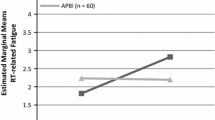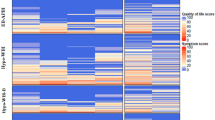Abstract
Purpose
It is not known which side effects (SEs) cancer patients undergoing definitive radiotherapy (RT) perceive as worse than others. Our objectives were to (1) identify the worst SEs in patients receiving definitive RT-predominant treatment using patient-reported outcomes and (2) investigate the prominence of physical SEs relative to psychosocial SEs.
Methods
In a single-center outpatient radiation oncology clinic, patients were surveyed on the final day of definitive RT. Sixty-seven cards listed SEs (40 physical and 27 psychosocial), and patients ranked the five most severe. Fifteen points were assigned to the top five selected SEs with descending scores of 5, 4, 3, 2, and 1.
Results
Fifty-five patients completed ≥ 4 weeks of RT with or without concurrent chemotherapy and had not received ≥ 4 weeks of neoadjuvant chemotherapy. Patients with head and neck and pelvis cancers perceived physical SEs as worse relative to psychosocial SEs; physical SEs filled 78% and 69% of the 15 points, respectively. In breast cancer patients, however, psychosocial SEs filled 45% of the 15 points in breast cancer patients (anxiety, depression, and sequelae), compared to 25% in others (P = 0.007). Affects my work, home duties, a SE not associated with the treatment itself, was the most frequently cited psychosocial SE (20% of cohort) and was ranked ninth overall.
Conclusion
Perceptions of SEs of cancer RT are dominated by physical quality of life (QoL) concerns and are influenced by the anatomic area receiving RT. Psychosocial QoL concerns are significantly more frequent in breast cancer patients.
Trial registration
ClinicalTrials.gov Identifier: NCT02978846

Similar content being viewed by others
References
Guyatt GH, Feeny DH, Patrick DL (1993) Measuring health-related quality of life. Ann Intern Med 118(8):622–629
Testa MA, Simonson DC (1996) Assessment of quality-of-life outcomes. NEJM. 334(13):835–840
Karimi M, Brazier J (2016) Health, health-related quality of life, and quality of life: what is the difference? Pharmacoeconomics. 34(7):645–649
Deshpande PR, Rajan S, Sudeepthi BL, Nazir CA (2011) Patient-reported outcomes: a new era in clinical research. Perspect Clin Res 2(4):137
Anker SD, Agewall S, Borggrefe M, Calvert M, Jaime Caro J, Cowie MR, Ford I, Paty JA, Riley JP, Swedberg K, Tavazzi L, Wiklund I, Kirchhof P (2014) The importance of patient-reported outcomes: a call for their comprehensive integration in cardiovascular clinical trials. Eur Heart J 35(30):2001–2009
Carelle N, Piotto E, Bellanger A, Germanaud J, Thuillier A, Khayat D (2002) Changing patient perceptions of the side effects of cancer chemotherapy. Cancer. 95(1):155–163
Coates A, Abraham S, Kaye SB, Sowerbutts T, Frewin C, Fox RM, Tattersall MHN (1983) On the receiving end—patient perception of the side-effects of cancer chemotherapy. Eur J Cancer 19(2):203–208
Griffin AM, Butow PN, Coates AS, Childs AM, Ellis PM, Dunn SM, Tattersall MHN (1996) On the receiving end V: patient perceptions of the side effects of cancer chemotherapy in 1993. Ann Oncol 7(2):189–195
Atkins L, Fallowfield L (2006) Intentional and non-intentional non-adherence to medication amongst breast cancer patients. Eur J Cancer 42(14):2271–2276
Essen L, Larsson G, Öberg K, Sjödén PO (2002) Satisfaction with care’: associations with health-related quality of life and psychosocial function among Swedish patients with endocrine gastrointestinal tumours. Eur J Cancer Care 11(2):91–99
Stark D, Kiely M, Smith A, Velikova G, House A, Selby P (2002) Anxiety disorders in cancer patients: their nature, associations, and relation to quality of life. J Clin Oncol 20(14):3137–3148
Steel JL, Geller DA, Gamblin TC, Olek MC, Carr BI (2007) Depression, immunity, and survival in patients with hepatobiliary carcinoma. J Clin Oncol 25(17):2397–2405
Penninx BW, Guralnik JM, Havlik RJ et al (1998) Chronically depressed mood and cancer risk in older persons. J Natl Cancer Inst 90(24):1888–1893
Hansen EK, Roach M (2010) Handbook of evidence-based radiation oncology, 2nd edn. Springer, New York, NY
Sellick SM, Edwardson AD (2007) Screening new cancer patients for psychological distress using the hospital anxiety and depression scale. Psycho-Oncol. 16(6):534–542
Ohayon MM, Schatzberg AF (2003) Using chronic pain to predict depressive morbidity in the general population. J Clin Psychiatry 60(1):39–47
Tylee A, Gandhi P (2005) The importance of somatic symptoms in depression in primary care. Primary care companion to the. J Clin Psychiatry 7(4):167–176
Jagsi R, Griffith KA, Boike TP, Walker E, Nurushev T, Grills IS, Moran JM, Feng M, Hayman J, Pierce LJ (2015) Differences in the acute toxic effects of breast radiotherapy by fractionation schedule: comparative analysis of physician-assessed and patient-reported outcomes in a large multicenter cohort. JAMA Oncol 1(7):918–930
Funding
This study did not have any grants or financial support.
Author information
Authors and Affiliations
Contributions
All authors have read and approved the manuscript.
Corresponding authors
Ethics declarations
Conflict of interest
The authors declare that they have no conflicts of interest.
Additional information
Publisher’s note
Springer Nature remains neutral with regard to jurisdictional claims in published maps and institutional affiliations.
Electronic supplementary material
Supplementary Table 1
Association between patient characteristics and select symptoms (in top 5 cards). P values were based on two-sided t-tests. (DOCX 13 kb)
Rights and permissions
About this article
Cite this article
Williams, P.A., Cao, S., Yang, D. et al. Patient-reported outcomes of the relative severity of side effects from cancer radiotherapy. Support Care Cancer 28, 309–316 (2020). https://doi.org/10.1007/s00520-019-04820-2
Received:
Accepted:
Published:
Issue Date:
DOI: https://doi.org/10.1007/s00520-019-04820-2




